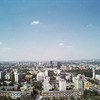A New POland
A high turnout (for Poland) was just one of the main differences between this year's election, which took place this Sunday the 21st of October, and the one in 2005. Another drastic difference was the result, as one day after the election the main opposition party, Civic Platform (PO), is poised to win. Though the official results won't be announced until this Tuesday, most votes have already been counted, and PO is likely to win in a landslide, with perhaps enough percentage points to form a minority government on their own, without a coalition. The pro-EU, pro-business and liberal opposition party, led by Donald Tusk, is ahead with about 41% of the votes, to the currently ruling party, Jaroslaw Kaczynski's Law and Justice (PiS), at about 32%.
By 7 pm last night, over half of the 30.5 million eligible voters in Poland had turned out to vote, in addition to the nearly 180,000 that were registered to vote outside of Poland, mainly in the UK and Ireland. Thanks to efforts by Polish politicians visiting Polish communities in the two countries, as well as 20 available polling stations, more than three times as many Poles abroad registered to vote in this election than in 2005. Within Poland, an intense campaign was run in Warsaw, mainly led by the web site Wybieram.pl, to convince young voters to head to the polls on Sunday. Perhaps the most amusing tactic was an SMS prank last week which urged young people to hide their grandmother's IDs. Without their identity cards, people cannot vote, and it was largely older citizens which voted the conservative Kaczynski twins into power, something most young people didn't want to see happen again, which was shown at the polls yesterday.
In fact, the turnout Sunday at 55% was the highest recorded in Poland since communism fell in 1989, a fact largely attributed to the youth vote. With the current results, Civic Platform will likely gain 205 of the 460 seats in the Sejm, the lower house of the Polish Parliament, and may form a coalition with the Polish Peasants Party, which will likely have 36 seats, for a majority. While the results will mean a change in prime minister, the position for the country's president, currently the prime minister's twin brother Lech Kaczynski, is not up for elections until 2010. However, if the opposition has enough of a gain they may be able to override the president's veto power for the next few years.
Stay tuned tomorrow for more news on what this change of government will mean for Poland.


 Coctail Bar Max & Dom Whisky
Coctail Bar Max & Dom Whisky
 Setka
Setka
 level 27
level 27





